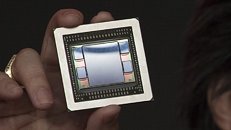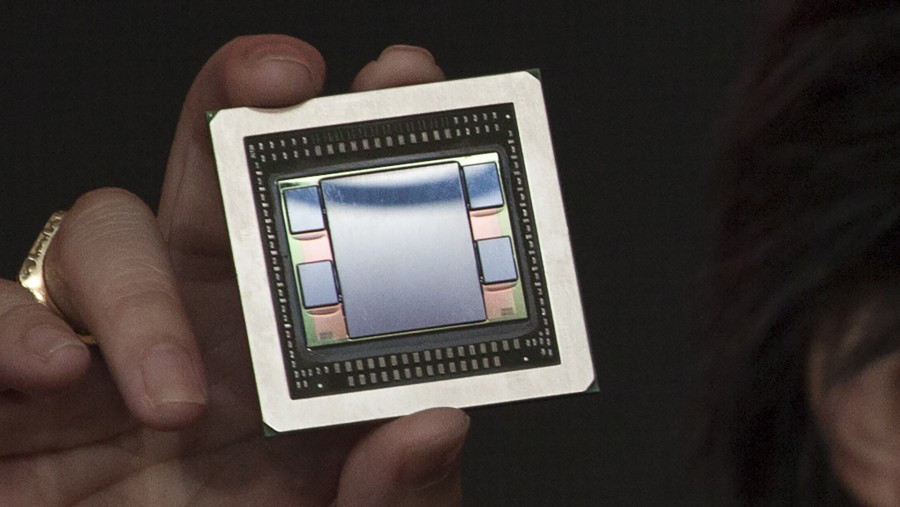- Joined
- Oct 9, 2007
- Messages
- 47,231 (7.55/day)
- Location
- Hyderabad, India
| System Name | RBMK-1000 |
|---|---|
| Processor | AMD Ryzen 7 5700G |
| Motherboard | ASUS ROG Strix B450-E Gaming |
| Cooling | DeepCool Gammax L240 V2 |
| Memory | 2x 8GB G.Skill Sniper X |
| Video Card(s) | Palit GeForce RTX 2080 SUPER GameRock |
| Storage | Western Digital Black NVMe 512GB |
| Display(s) | BenQ 1440p 60 Hz 27-inch |
| Case | Corsair Carbide 100R |
| Audio Device(s) | ASUS SupremeFX S1220A |
| Power Supply | Cooler Master MWE Gold 650W |
| Mouse | ASUS ROG Strix Impact |
| Keyboard | Gamdias Hermes E2 |
| Software | Windows 11 Pro |
AMD CTO, speaking at an investors event organized by Deutsche Bank, recently announced that the company's next-generation "Vega" GPUs, its first high-end parts in close to two years, will be launched in the first half of 2017. AMD is said to have made significant performance/Watt refinements with Vega, over its current "Polaris" architecture. VideoCardz posted probable specs of three parts based on the architecture.
AMD will begin the "Vega" architecture lineup with the Vega 10, an upper-performance segment part designed to disrupt NVIDIA's high-end lineup, with a performance positioning somewhere between the GP104 and GP102. This chip is expected to be endowed with 4,096 stream processors, with up to 24 TFLOP/s 16-bit (half-precision) floating point performance. It will feature 8-16 GB of HBM2 memory with up to 512 GB/s memory bandwidth. AMD is looking at typical board power (TBP) ratings around 225W.

Next up, is "Vega 20." This is one part we've never heard of today, and it's likely scheduled for much later. "Vega 20" is a die-shrink of Vega 10 to the 7 nm GF9 process being developed by GlobalFoundries. It will feature 4,096 stream processors, too, but likely at higher clocks, up to 32 GB of HBM2 memory running full-cylinders at 1 TB/s, PCI-Express gen 4.0 bus support, and a typical board power of 150W.
The "Vega 11" part is a mid-range chip designed to replace "Polaris 10" from the product-stack, and offer slightly higher performance at vastly better performance/Watt. AMD is expecting to roll out the "Navi" architecture some time in 2019, and so AMD will hold out for the next two years with "Vega." There's even talk of a dual-GPU "Vega" product featuring a pair of Vega 10 ASICs.
View at TechPowerUp Main Site
AMD will begin the "Vega" architecture lineup with the Vega 10, an upper-performance segment part designed to disrupt NVIDIA's high-end lineup, with a performance positioning somewhere between the GP104 and GP102. This chip is expected to be endowed with 4,096 stream processors, with up to 24 TFLOP/s 16-bit (half-precision) floating point performance. It will feature 8-16 GB of HBM2 memory with up to 512 GB/s memory bandwidth. AMD is looking at typical board power (TBP) ratings around 225W.

Next up, is "Vega 20." This is one part we've never heard of today, and it's likely scheduled for much later. "Vega 20" is a die-shrink of Vega 10 to the 7 nm GF9 process being developed by GlobalFoundries. It will feature 4,096 stream processors, too, but likely at higher clocks, up to 32 GB of HBM2 memory running full-cylinders at 1 TB/s, PCI-Express gen 4.0 bus support, and a typical board power of 150W.
The "Vega 11" part is a mid-range chip designed to replace "Polaris 10" from the product-stack, and offer slightly higher performance at vastly better performance/Watt. AMD is expecting to roll out the "Navi" architecture some time in 2019, and so AMD will hold out for the next two years with "Vega." There's even talk of a dual-GPU "Vega" product featuring a pair of Vega 10 ASICs.
View at TechPowerUp Main Site

 Vega 11 should be faster hopefully
Vega 11 should be faster hopefully 







 At least NVIDIA are still releasing decent cards, even if they're competing with themselves mostly and we have to pay more for less.
At least NVIDIA are still releasing decent cards, even if they're competing with themselves mostly and we have to pay more for less. 
